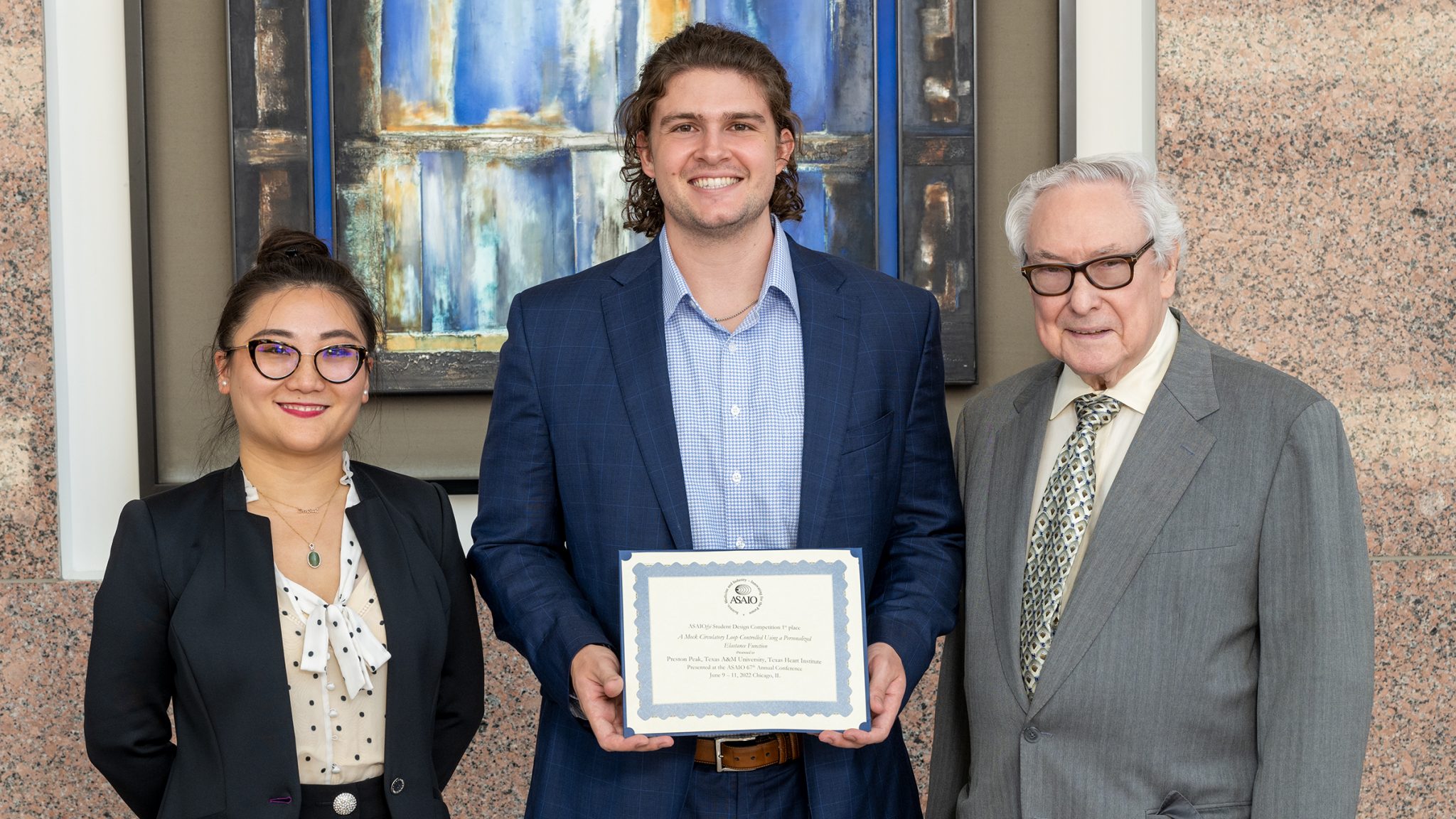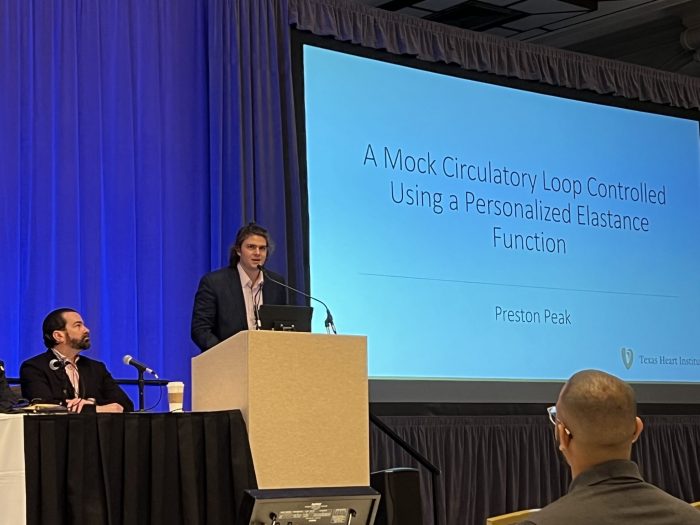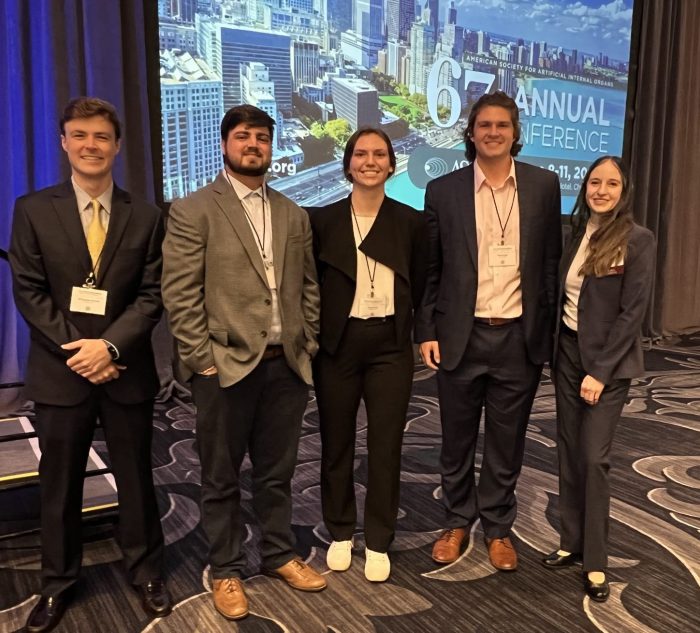THI IDEA Lab’s Preston Peak Wins ASAIO Student Design Competition

Preston Peak, a Student Scholar in Texas Heart Institute’s Innovative Device and Engineering Applications (IDEA) Lab, has won first place in the Student Design Competition at the American Society for Artificial Internal Organs (ASAIO’s) 67th Annual Conference, held in Chicago from June 8-11, 2022.
As a finalist in the competition sponsored by the ASAIOfyi (for young innovators) program, Peak gave a platform presentation for his project “A Mock Circulatory Loop Controlled Using a Personalized Elastance Function.”
The Texas A&M University biomedical engineering major presented his work in a special session with other student finalists from Florida Institute of Technology and The Ohio State University.
The ASAIO’s annual conference provides a forum for scientists, engineers, and physicians involved in basic and clinical research to develop innovative medical devices. The society’s interdisciplinary membership strives to “save lives one medical device at a time” by providing technological solutions to treat patients with kidney, heart, lung, liver, pancreatic, or nervous system diseases.
The ASAIOfyi program emphasizes the future of organ replacement therapy by advancing the work of young clinicians, engineers, and early-career scientists in the field of artificial organ technologies.
The career development initiative focuses on the scientific guidance of undergraduate and graduate students, postdoctoral fellows, and young investigators, both in academia and industry. The Student Design Competition that Peak won specifically highlights medical technology design projects by undergraduate students, preferably those in their senior year of an engineering program.


Peak’s research at THI is mentored by O. H. Frazier, MD, and Yaxin Wang, PhD, and centers on the development of improved methods to test and analyze the performance of cardiac assist devices. Mock circulatory loop testing—the use of a lab-bench based, mechanical system that simulates the human cardiovascular system—has become a crucial part of developing new cardiac assist devices such as ventricular assist devices (VADs) and total artificial hearts.
To experiment with new devices in a model circulatory system, the test platforms use an assembly of acrylic chambers, mechanical valves, motors, pistons, flexible tubing, sensors, electrical components, and software control to model the heart chambers, heart valves, and vasculature under conditions mimicking rest, exercise, and various cardiovascular disease states.
Engineers, especially those in the IDEA Lab, seek improvements to loop performance that will more accurately reflect the complexity of the human cardiovascular system and therefore provide more useful testing data.
Specifically, Peak’s circulatory loop design includes improvements that allow patient-specific modeling by adding in the personalized elastance function of a patient’s heart. The elastance function describes how the heart contracts over the time of one cardiac cycle. By using two special programmable controllers to control the loop’s left ventricular piston during different phases of the cardiac cycle, Peak’s new system can create pressure-volume loops that are like those seen when a patient’s heart beats.
The ability to create these individualized pressure-volume loops allows the test system to simulate various disease states, such as heart failure. This loop-system design advance will enhance the testing and refinement of future heart-assist devices, like those currently in development in the IDEA Lab.
Peak graduated from Texas A&M University this past spring with a BS in Biomedical Engineering. He started as a Student Scholar in the THI Cardiovascular Pathology Laboratory in January 2021 and then transitioned to the IDEA Lab in August 2021. He joined the undergraduate internship program at THI because of his interest in medical device design and research, specifically in cardiac assist devices.
“I have learned so much working as a Student Scholar in both the Cardiovascular Pathology Lab and the IDEA Lab. I’ve received amazing mentorship, met incredible people, and discovered that I have a genuine interest in research. I don’t know what the future holds, but I’m very happy to continue working on our incredible research projects as a member of the IDEA Lab,” shared Peak.
Yaxin Wang, PhD, Assistant Investigator and Director of the IDEA Lab, commented, “Preston is a brilliant and hard-working young engineer. I witnessed his transition from a new Texas A&M undergraduate Student Scholar working in the lab a year ago, to a junior-level research engineer who now leads his own project. I hope his story will inspire future Student Scholars to be confident and believe they will also come up with brilliant ‘IDEAs.’”
Darren Woodside, PhD, THI Vice President for Research, highlighted the significance of Peak’s achievement, remarking, “Preston deserves our utmost congratulations for his success at ASAIO. His winning of the competitive Student Design Competition at ASAIO underscores the innovative approaches and impact of the team. The group is clearly living up to the name of the IDEA Lab.”




